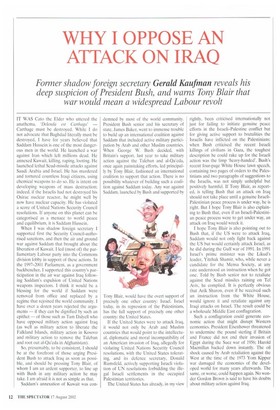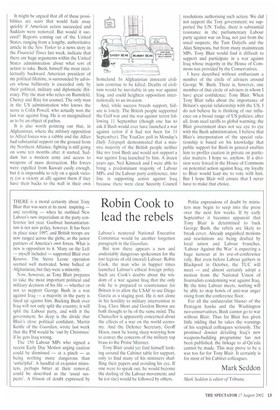WHY I OPPOSE AN ATTACK ON IRAQ
Former shadow foreign secretary Gerald Kaufman reveals his
deep suspicion of President Bush, and warns Tony Blair that war would mean a widespread Labour revolt
IT WAS Cato the Elder who uttered the anathema, Delenda est Carthago' — Carthage must be destroyed. While I do not advocate that Baghdad literally must be destroyed, I have for years believed that Saddam Hussein is one of the most dangerous men in the world. He launched a war against Iran which left millions dead. He annexed Kuwait, killing, raping, looting. He launched lethal Scud-missile attacks against Saudi Arabia and Israel. He has murdered and tortured countless Iraqi citizens, using chemical weapons to do so. He is intent on developing weapons of mass destruction; indeed, if the Israelis had not destroyed his Osirac nuclear reactor, he might well by now have nuclear capacity. He has violated a score of United Nations Security Council resolutions. If anyone on this planet can be categorised as a menace to world peace and equilibrium, it is Saddam Hussein.
When I was shadow foreign secretary I supported first the Security Council-authorised sanctions, and then the air and ground war against Saddam that brought about the liberation of Kuwait. Lied (most of) the parliamentary Labour party into the Commons division lobby in support of these actions. In the 1997-2001 Parliament, as a government backbencher, I supported this country's participation in the air war against Iraq following Saddam's expulsion of United Nations weapons inspectors. I think it would be a blessing for the world if Saddam were removed from office and replaced by a regime that rejoined the world community. I have over a dozen years rejected the arguments — if they can be dignified by such an epithet — of those such as Tam Dalyell who have opposed military action against Iraq (as well as military action to liberate the Falkland Islands, military action in Kosovo and military action to remove the Taleban and root out al-Qa'eda in Afghanistan).
So, presumably, to be consistent, I should be at the forefront of those urging President Bush to attack Iraq as soon as possible, and should be pressing Tony Blair, of whom I am an ardent supporter, to line up with Bush in any military action he may take. I am afraid it is not as simple as that.
Saddam's annexation of Kuwait was con demned by most of the world community. President Bush senior and his secretary of state, James Baker, went to immense trouble to build up an international coalition against Saddam that included active military participation by Arab and other Muslim countries. When George W. Bush decided, with Britain's support, last year to take military action against the Talehan and al-Qa'eda, once again painstaking efforts, led principally by Tony Blair, fashioned an international coalition to support that action. There is no possibility whatever of building such a coalition against Saddam today. Any war against Saddam, launched by Bush and supported by Tony Blair, would have the overt support of precisely one other country: Israel. Israel today, in its repression of the Palestinians, has the full support of precisely one other country: the United States.
If the United States were to attack Iraq, it would not only be Arab and Muslim countries that would point to the intellectual, diplomatic and moral incompatibility of an American invasion of Iraq, allegedly for violating United Nations Security Council resolutions, with the United States tolerating, and its defence secretary, Donald Rumsfeld, actively supporting Israeli violation of UN resolutions forbidding the illegal Israeli settlements in the occupied Palestinian territories.
The United States has already, in my view
rightly, been criticised internationally not just for failing to initiate genuine peace efforts in the Israeli–Palestine conflict but for giving active support to brutalities the Israelis have inflicted on the Palestinians; when Bush criticised the recent Israeli killings of civilians in Gaza, the toughest description he could rake up for the Israeli action was the limp 'heavy-handed'. Bush's recent four-page White House lawn speech, containing two pages of orders to the Palestinians and two paragraphs of suggestions to the Israelis, was not simply unhelpful but positively harmful, If Tony Blair, as reported, is telling Bush that an attack on Iraq should not take place until a genuine IsraeliPalestinian peace process is under way, he is right. But I hope Tony Blair is also explaining to Bush that, even if an Israeli-Palestinian peace process were to get under way, an attack on Iraq would wreck it.
I hope Tony Blair is also pointing out to Bush that, if the US were to attack Iraq, Saddam would not only fight back against the US but would certainly attack Israel, as he did during the Gulf war of 1991. In 1991 Israel's prime minister was the Likud's leader, Yitzhak Shamir, who, while never a candidate for the Mensa Society, at any rate understood an instruction when he got one. Told by Bush senior not to retaliate against the Scud missiles raining on Tel Aviv, he complied. It is perfectly obvious that Arik Sharon, even if he received such an instruction from the White House, would ignore it and retaliate against any Iraqi attacks on Israel. The result could be a wholesale Middle East conflagration.
Such a conflagration could generate economic action that might disrupt Western economies, President Eisenhower threatened to undermine the pound sterling if Britain and France did not end their invasion of Egypt during the Suez war of 1956; Harold Macmillan backed down instantly. The oil shock caused by Arab retaliation against the West at the time of the 1973 Yom Kippur war damaged the economies of the developed world for many years afterwards. The same, or worse, could happen again. No wonder Gordon Brown is said to have his doubts about military action against Iraq. It might be argued that all of these possibilities are scars that would fade away quickly if American action succeeded and Saddam were removed. But would it succeed? Reports coming out of the United States, ranging from a lengthy, authoritative article in the New Yorker to a news story in the Financial Times last week, indicate that there are huge arguments within the United States administration about what sort of action to take. Bush, himself the most intellectually backward American president of my political lifetime, is surrounded by advisers whose bellicosity is exceeded only by their political, military and diplomatic illiteracy. Pity the man who relies on Rumsfeld, Cheney and Rice for counsel. The only man in the U.S administration who knows the score is Colin Powell, who actually won the last war against Iraq. He is so marginalised as to be an object of pathos.
It is also worth pointing out that, in Afghanistan, where the military opposition to Allied forces was a rabble and the Allies had substantial support on the ground from the Northern Alliance, fighting is still going on some ten months after it started. Saddam has a modern army and access to weapons of mass destruction. His forces were expelled from Kuwait easily enough, but it is impossible to rely on a quick victory (or a victory at all) against them if they have their backs to the wall in their own homeland. In Afghanistan innocent civilians continue to be killed. Deaths of civilians would be inevitable in any war against Iraq, and could heighten opposition internationally to an invasion.
And, while success breeds support, failure is lonely. The British people supported the Gulf war and the war against terror following II September (though one has to ask if Bush would ever have launched a war against terror if it had not been for 11 September). The YouGov poll in Monday's Daily Telegraph demonstrated that a massive majority of the British people neither like nor trust Bush and would not support a war against Iraq launched by him. A dozen years ago, Neil Kinnock and I were able to bring a predominant majority of Labour MPs, and the Labour party conference, into line in supporting action against Iraq because there were clear Security Council resolutions authorising such action. We did not support the Tory government; we supported the UN. Today, there is substantial resistance in the parliamentary Labour party against war on Iraq, not just from the usual suspects, the Tam Dalyells and the Alan Simpsons, but from many mainstream MPs. Tony Blair would find it difficult to support and participate in a war against Iraq whose majority in the House of Commons was provided by the Conservatives.
I have described without enthusiasm a number of the circle of advisers around George W. Bush. There is, however, one member of that circle of advisers in whom I have great confidence: Tony Blair. When Tony Blair talks about the importance of Britain's special relationship with the US, I do not believe he is thinking of our influence on a broad range of US policies; after all, from steel tariffs to global warming, the Blair government does not see eye to eye with the Bush administration. I believe that Blair's interpretation of the special relationship is based on his knowledge that public support for Bush in general enables him to proffer caution in private on particular matters. I hope so. anyhow. If a division were forced in the House of Commons on potential action against Iraq, my loyalty to Blair would lead me to vote with him. But I hope Blair will ensure that I never have to make that choice.































































 Previous page
Previous page